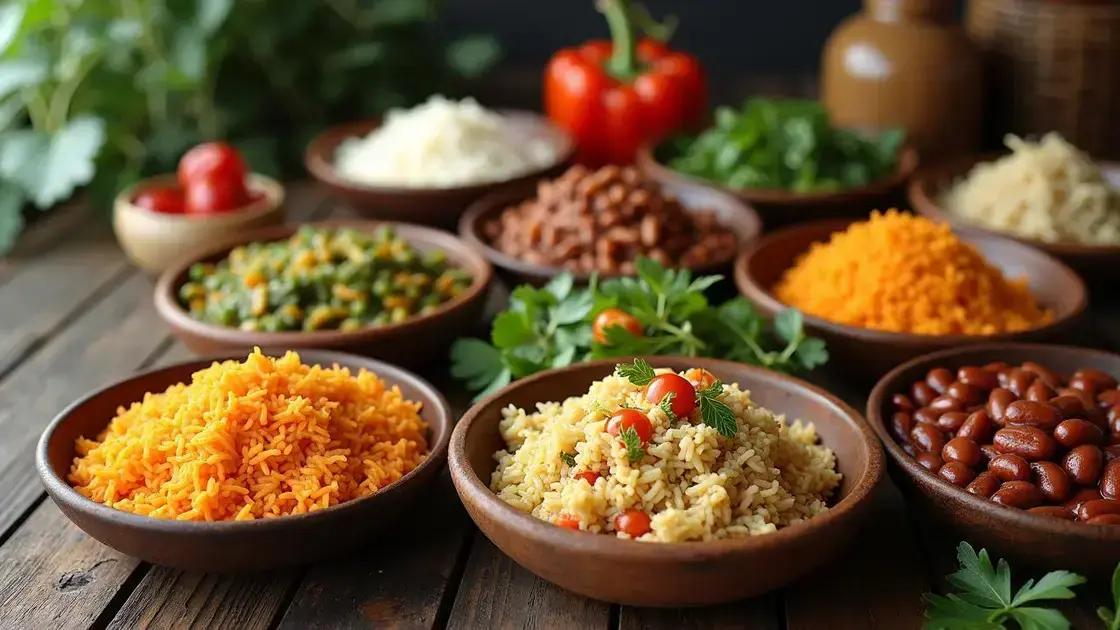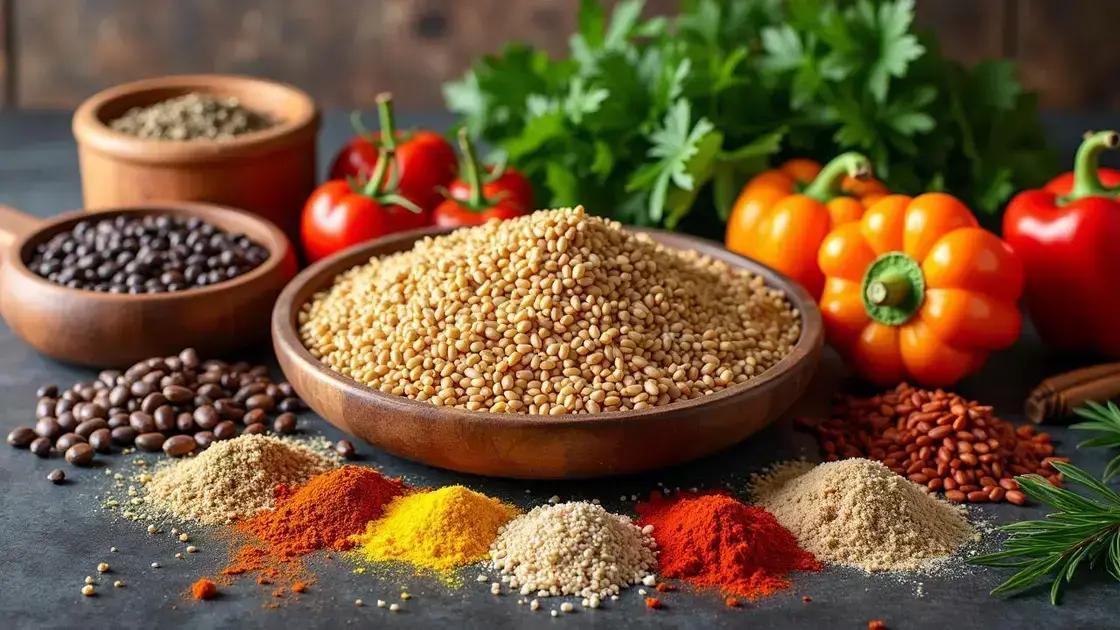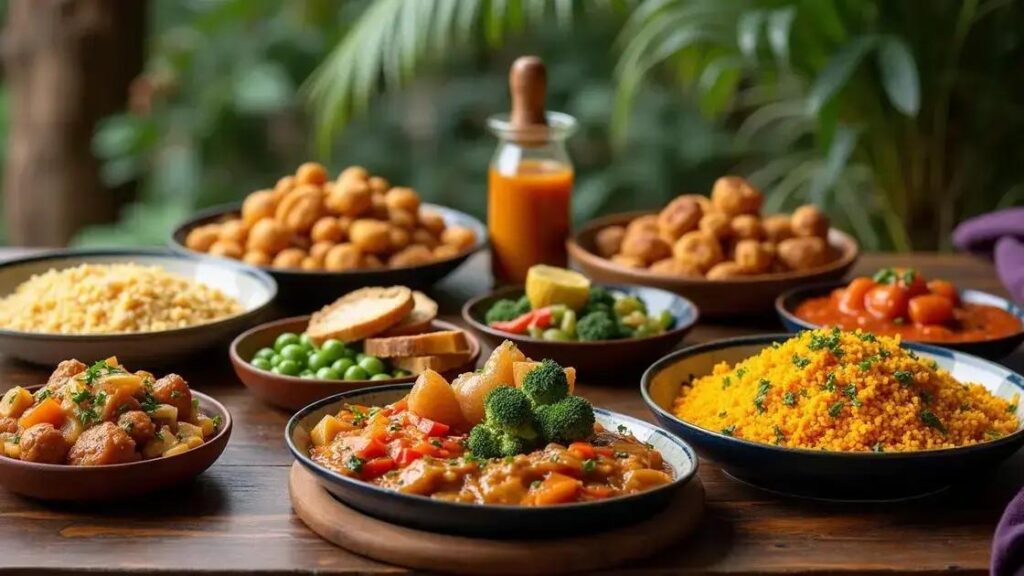African recipes provide a cost-effective solution for meals, utilizing budget-friendly ingredients like legumes, grains, and seasonal vegetables, while traditional cooking methods enhance flavor without increasing costs.
If you’re searching for ways to save money on meals without compromising flavor, explore the truth behind African recipes. These dishes offer a variety of ingredients that are not only budget-friendly but also packed with flavor. In this article, we dive into how African recipes present a cost-effective solution for anyone looking to eat well while keeping expenses low.
Exploring African Recipes for Budget-Friendly Meals

Exploring African recipes can lead to discovering many options for budget-friendly meals. Many traditional African dishes utilize locally sourced ingredients that are both cost-effective and nutritious. This makes these recipes ideal for anyone looking to save money while enjoying flavorful and healthy meals.
Staples of African Cooking
In many African cultures, meals are centered around staples such as rice, corn, beans, and cassava. These ingredients are not only affordable but also versatile. For instance, corn can be transformed into a variety of dishes, including porridge and dumplings, providing several meal options from just one ingredient.
Traditional Cooking Methods
African cooking also emphasizes traditional methods that often require less expensive equipment. Techniques like stewing, grilling, and boiling can enhance the flavors of inexpensive cuts of meat or even vegetarian dishes, allowing families to enjoy hearty meals without breaking the bank.
Meal Preparation and Planning
Planning meals in advance can significantly reduce food costs. Preparing a weekly menu based on what’s in season or on sale can help you make the most of your budget. Consider creating a shopping list with local markets in mind to find the freshest ingredients at lower prices.
Affordable African Dishes to Try
Some affordable African dishes include:
– Jollof Rice: A one-pot dish made with rice, tomatoes, and spices that can be customized with vegetables or meat.
– Ugali: A simple recipe made from cornmeal that can be served with a variety of sauces or stews.
– Chickpea Stew: Packed with protein and can be made with inexpensive vegetables and spices for a warm, filling meal.
By exploring these affordable options, you’ll find that African cuisine offers delicious ways to eat well without overspending. Enjoying traditional African meals can be both satisfying and economical, proving that cooking can be done affordably without sacrificing taste.
Key Ingredients that Make African Cooking Affordable

There are several key ingredients that make African cooking not only delicious but also affordable. Understanding these ingredients can help you create meals that are both nutritious and cost-effective.
1. Legumes
Beans and lentils are staples in many African diets. They are cheap, high in protein, and can be used in a variety of dishes. Recipes like bean stews and pulses salad can be made in large batches, providing great value.
2. Grains
Rice, maize, and millet are common grains used in African cuisine. These grains are versatile and can be served as the base for many meals. For instance, rice can be used in dishes such as Jollof rice or served with stews and curries.
3. Vegetables
Vegetables like spinach, kale, and sweet potatoes are not only nutritious but also budget-friendly. They can be included in salads, stews, or served as side dishes to add color and health benefits.
4. Spices and Seasonings
Many traditional African dishes are flavored with spices like cumin, coriander, and chili peppers. Using these spices enhances the taste without adding significantly to the cost. A little can go a long way in creating delicious meals.
5. Affordable Proteins
While meat can be expensive, chicken, fish, and eggs are often more affordable protein sources. Incorporating these proteins in moderation can help keep costs down while still providing essential nutrients.
By focusing on these key ingredients, anyone can prepare tasty African meals that are gentle on the wallet. Utilizing local and seasonal products can also further reduce costs, making it easy to enjoy authentic flavors without overspending.
Is African Cooking a Cost-Effective Solution for You?
African recipes provide a unique opportunity to enjoy flavorful dishes without spending a fortune. By exploring budget-friendly meals and focusing on key ingredients such as legumes, grains, and affordable proteins, anyone can enjoy the rich flavors of African cuisine.
Moreover, the traditional cooking methods used in these recipes often emphasize using whole, local ingredients that maximize taste while minimizing cost. Planning meals and utilizing seasonal produce can further enhance this cost-effectiveness.
Ultimately, choosing African recipes not only supports diverse culinary traditions but also promotes healthy eating on a budget. Dive into the world of African cooking and experience a delicious and economic way to nourish your family.
FAQ – Frequently Asked Questions about African Recipes and Cooking
What are some affordable African dishes I can try?
You can try dishes like Jollof rice, Ugali, or Chickpea stew, which use budget-friendly ingredients and are delicious.
How can I make African cooking more cost-effective?
Focus on using staples like legumes, grains, and seasonal vegetables, and plan your meals to maximize ingredient use.
What key ingredients should I stock for African cooking?
Legumes, grains like rice and millet, affordable proteins, and spices are essential for creating a variety of African dishes.
Are African recipes healthy?
Yes, many African recipes incorporate nutritious ingredients such as vegetables, legumes, and whole grains, making them healthy options.
How do traditional cooking methods save money?
Traditional cooking methods often use less expensive cuts of meat and focus on techniques like stewing and boiling, which enhance flavors while keeping costs low.
Where can I find authentic African recipes?
You can find authentic African recipes in cookbooks, online food blogs, and local cultural organizations that celebrate African cuisine.













